Group Members
Members of the Scientific Careers Research & Development Group bring a wealth of experiences, including many years of laboratory-based research and training of young scientists, extensive STEM program evaluation, and leadership in theory-based approaches that promote diversity and support underrepresented groups and women in academic science environments. All members are skilled with qualitative research methods and data analysis; some have expertise with quantitative methods Our team is uniquely positioned to focus on questions and hypotheses that can only be addressed with longitudinal qualitative methods.
Current Members
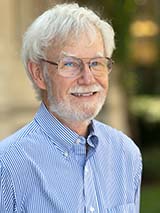
Rick McGee, PhD
Group Leader
Associate Dean for Professional Development and Professor of Medical Education and Faculty Development, Feinberg School of Medicine
I established the Scientific Careers Research & Development Group in 2009 as a platform for novel research studies to more deeply understand how biomedical scientists develop as scientists throughout their career trajectories and, particularly, why diversity in science has been so difficult to achieve. To address the lack of representation in science requires new collaborations between natural and social scientists.
Our current studies rely primarily on longitudinal, interview-based, qualitative research methods and data analysis informed by social science theories. These novel studies include a first-ever empirical study of the development of several hundred biomedical PhD students, the National Longitudinal Study of Young Life Scientists (funded by NIH since 2008). The second study continues to follow the career trajectories of 160 PhD students (and equivalent controls) who took part in a novel career coaching experiment, The Academy for Future Science Faculty. I bring to these studies over 40 years of experience in the biomedical sciences, first as a successful cellular neurobiologist and pharmacology professor, and subsequently through creating, leading and studying approaches to developing talents of young scientists. During this time, a major objective of my work has been to increase the diversity of research and medicine. In my current academic position within the Faculty Affairs Office at Feinberg, my primary responsibility is to support development of the independent research programs of early career faculty.
Over the past 20 years, I have developed a novel approach to teaching grant wiring by leading coached writing groups that last two to four months. This concept and value of coached grant writing groups has been recognized and expanded through the National Research Mentoring Network (NRMN), including a current randomized trial comparing four variations. Finally, I am deeply involved with new approaches to promoting and teaching the skills of effective mentoring relationships, especially culturally aware mentorship, through NRMN.
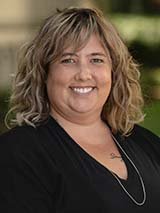
Christine Wood, PhD
Research Assistant Professor
Research Assistant Professor, Medical Social Sciences, Feinberg School of Medicine
I am a research assistant professor of Medical Social Sciences and a longtime member of the SCRDG team. My research spans the sociology of medicine, science and technology studies, and gender and sexuality. My dissertation research focused on the institutional context of the development of women’s and gender studies in the United States. I am PI on a National Science Foundation grant examining the experiences of biomedical scientists during COVID-19 and have recently begun conducting research on LGBTQ+ individuals in the biomedical and STEM pipelines. My book, "Social Studies of Gender: A Next Wave Reader," was published in 2020. With SCRDG, I have contributed to both the NLSYS and The Academy for Future Science Faculty, playing a leading role in the analysis of gender disparities in biomedicine as well as intersectionality research.
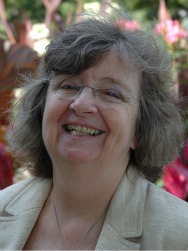
Patricia Campbell, PhD
Consulting Scientist
President, Campbell-Kibler Associates, Inc.
I am the president of Campbell-Kibler Associates, Inc. (CKA), where I’ve worked in research and evaluation with a focus on issues of race/ethnicity, gender and disability, particularly in the sciences, for many years. As part of my work, I became involved with Rick McGee, PhD, in SCRDG at its very beginning and continue to be involved in interviewing, writing and reviewing. Prior to founding CKA, I was an associate professor of research, measurement and statistics at Georgia State University. An Association for Women in Science (AWIS) Fellow, I was also awarded the Willystine Goodsell Award by the American Educational Research Association. I have over 120 publications including, with Veronica Thomas, “Evaluation in Today’s World: Respecting Diversity, Improving Quality, and Promoting Usability,” which was selected for a 2021 Most Promising New Textbook Award from the Textbook & Academic Authors Association.
My major passion is to use research and evaluation to help dismantle systemic racism and sexism in education and the sciences. My efforts to do that include conducting educational evaluation and research training in South Africa and Uganda and serving as an expert witness in The Citadel sex discrimination case.

Anne Skelley-Caliendo, MSEd
Research Project Manager
I am a qualitative researcher at Northwestern University Feinberg School of Medicine. My previous work concerned education policies, practices and structures that encourage STEM creativity and motivation in young people. I currently work on explorations of career decision-making and programming among graduate and postdoctoral trainees in biomedicine. I also partner with clinical investigators to implement qualitative studies that inform interventions related to patient engagement, quality of life and healthcare delivery in fields such as otolaryngology, pharmacology and pediatric rheumatology.
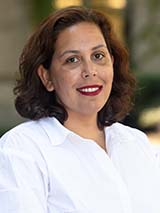
Ida Salusky, MPH, PhD
Research Associate
I am a clinical-community psychologist. My work broadly focuses on system-level interventions to address issues of structural inequality and oppression. I currently conduct research examining educational access and equity for minoritized students in higher education settings. As a member of the SCRDG, I primarily contribute to the The Academy for Future Science Faculty intervention. I also conduct longitudinal research on support systems for first-generation college students to understand how they thrive within institutions historically designed to exclude them. Previously, I spent many years working on ethnographic research exploring how women of Haitian descent in the Dominican Republic resist structural violence. I am passionate about qualitative research and have taught graduate-level seminars on qualitative methods. Apart from my research and teaching, I am active in coalition work to develop an integrated mental healthcare network for immigrants and refugees in the city of Chicago. Prior to joining the SCRDG team, I was an assistant professor of clinical-community psychology at DePaul University.
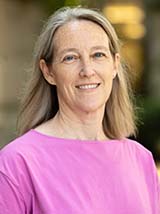
Robin Remich, MAT, MEd
Research Associate
As an education professional with over 30 years of experience, I am driven to examine how the United States educational system has marginalized many people of varying abilities, social classes, races, genders and learning differences. I took a leap early in my career from teaching first grade to working in higher education and have not looked back. I keep learning at every job: residence life director, academic advisor, TRiO program and learning center coordinator, and currently, as a researcher with the SCRDG team.
A number of pivotal experiences have shaped my desire to understand student experiences and how people navigate the often-hidden aspects of university cultures, language and norms. I completed graduate work in adult education/developmental studies, a discipline centered on reframing the deficit narrative of remedial education to interrogate how institutions can examine their barriers that inhibit student success. Prior to working at Northwestern, I spent 13 years in a diverse community college environment where I was privileged to support many first-generation, ESL and non-traditional college students.
On the SCRDG team my primary role is with the National Longitudinal Study of Young Life Scientists (NLSYLS). Between 2008 and 2010, I visited 12 institutions to meet over 80 study participants. A highlight of each year is talking with study participants to capture and understand their experiences. Outside of work, I volunteer with Evanston Scholars, a college access and success program.
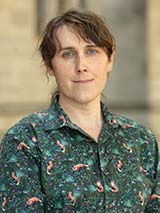
Remi Jones
Research Associate

Júlia Mendes, PhD
Research Associate
I completed my PhD in higher education in May of 2022 at Loyola University Chicago. From Loyola I also received my master's in sociology after earning my bachelor's in sociology at Illinois State University. My research provides an in-depth and intimate insight into the lives of young immigrants, with a focus on undocumented communities. My master's thesis chronicled experiences of trauma and survival in young Mexican immigrants, while my dissertation took a different approach, telling stories of survival and resistance through experiences of joy. I am passionate about my work and advocate for participant-led research methodologies.
Former Members
Fatimah Bhatti
Lynn Gazley, PhD, MPH
Nicole Langford, BS
Letitia Onyango, MS
Ebony McGee, PhD
Michelle Naffziger, PhD
Jennifer Richardson
Bhoomi Thakore, PhD
Simon Williams, PhD MA MSc
Veronica Womack, PhD